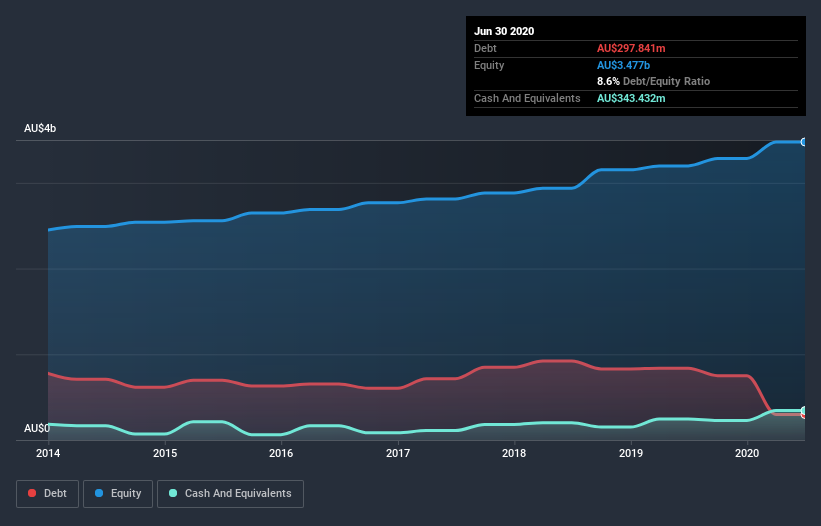Harvey Norman Holdings (ASX:HVN) Seems To Use Debt Rather Sparingly
The external fund manager backed by Berkshire Hathaway's Charlie Munger, Li Lu, makes no bones about it when he says 'The biggest investment risk is not the volatility of prices, but whether you will suffer a permanent loss of capital.' So it seems the smart money knows that debt - which is usually involved in bankruptcies - is a very important factor, when you assess how risky a company is. We note that Harvey Norman Holdings Limited (ASX:HVN) does have debt on its balance sheet. But is this debt a concern to shareholders?
When Is Debt A Problem?
Debt and other liabilities become risky for a business when it cannot easily fulfill those obligations, either with free cash flow or by raising capital at an attractive price. If things get really bad, the lenders can take control of the business. However, a more usual (but still expensive) situation is where a company must dilute shareholders at a cheap share price simply to get debt under control. Of course, plenty of companies use debt to fund growth, without any negative consequences. When we examine debt levels, we first consider both cash and debt levels, together.
Check out our latest analysis for Harvey Norman Holdings
What Is Harvey Norman Holdings's Net Debt?
The image below, which you can click on for greater detail, shows that Harvey Norman Holdings had debt of AU$297.8m at the end of June 2020, a reduction from AU$838.0m over a year. However, it does have AU$343.4m in cash offsetting this, leading to net cash of AU$45.6m.
A Look At Harvey Norman Holdings's Liabilities
Zooming in on the latest balance sheet data, we can see that Harvey Norman Holdings had liabilities of AU$785.4m due within 12 months and liabilities of AU$1.57b due beyond that. Offsetting these obligations, it had cash of AU$343.4m as well as receivables valued at AU$511.6m due within 12 months. So its liabilities outweigh the sum of its cash and (near-term) receivables by AU$1.50b.
Harvey Norman Holdings has a market capitalization of AU$5.84b, so it could very likely raise cash to ameliorate its balance sheet, if the need arose. However, it is still worthwhile taking a close look at its ability to pay off debt. While it does have liabilities worth noting, Harvey Norman Holdings also has more cash than debt, so we're pretty confident it can manage its debt safely.
In addition to that, we're happy to report that Harvey Norman Holdings has boosted its EBIT by 53%, thus reducing the spectre of future debt repayments. There's no doubt that we learn most about debt from the balance sheet. But it is future earnings, more than anything, that will determine Harvey Norman Holdings's ability to maintain a healthy balance sheet going forward. So if you're focused on the future you can check out this free report showing analyst profit forecasts.
But our final consideration is also important, because a company cannot pay debt with paper profits; it needs cold hard cash. While Harvey Norman Holdings has net cash on its balance sheet, it's still worth taking a look at its ability to convert earnings before interest and tax (EBIT) to free cash flow, to help us understand how quickly it is building (or eroding) that cash balance. During the last three years, Harvey Norman Holdings generated free cash flow amounting to a very robust 98% of its EBIT, more than we'd expect. That puts it in a very strong position to pay down debt.
Summing up
While Harvey Norman Holdings does have more liabilities than liquid assets, it also has net cash of AU$45.6m. And it impressed us with free cash flow of AU$963m, being 98% of its EBIT. So is Harvey Norman Holdings's debt a risk? It doesn't seem so to us. The balance sheet is clearly the area to focus on when you are analysing debt. However, not all investment risk resides within the balance sheet - far from it. Consider for instance, the ever-present spectre of investment risk. We've identified 2 warning signs with Harvey Norman Holdings (at least 1 which can't be ignored) , and understanding them should be part of your investment process.
If, after all that, you're more interested in a fast growing company with a rock-solid balance sheet, then check out our list of net cash growth stocks without delay.
This article by Simply Wall St is general in nature. It does not constitute a recommendation to buy or sell any stock, and does not take account of your objectives, or your financial situation. We aim to bring you long-term focused analysis driven by fundamental data. Note that our analysis may not factor in the latest price-sensitive company announcements or qualitative material. Simply Wall St has no position in any stocks mentioned.
Have feedback on this article? Concerned about the content? Get in touch with us directly. Alternatively, email editorial-team@simplywallst.com.


